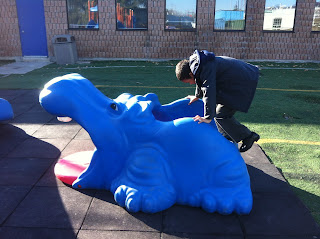We began our sunny Monday with sensory diets, play and math ring toss. Ring toss is a great tool to work on our fine and gross motor skills, visual spatial awareness, hand-eye coordination, accuracy, turn taking, sportsmanship, and math skills. Sensory diets are so important for regulation, auditory processing skills, teamwork, social skills, sportsmanship, motor planning, body mapping, sequencing, gross motor skills, proprioception skills, vestibular and bilateral movements, and balance and coordination. Play is so important for creativity, language arts and communication skills, mathematics skills, role-play and drama, fine motor skills, teamwork, and social skills.
Math Ring Toss- counting by 3's, 4's, 5's, 7's, 8's, 9's, 10's and 20's.
Play
Here we are reading and editing Mr. Jacob's morning message. Everyone worked so well together using their spelling, grammar, punctuation, phonics, reading skills, and team work and social skills!
MR. Zachary is helping MR. Carter with our morning attendance sheet.
Mr. Sander was our teacher today and went over months, weeks, dates, days, year, weather, time, and feelings.
Sensory breaks are great for regulation, physical exercise, gross motor skills, body planning and mapping, bilateral movements, and for our vestibular and proprioceptive needs.
After our break we decided to discuss, brain storm, problem solve, and use our mathematical skills (number sense and numeracy, division, multiplication, and money skills) to figure out how much each student needs to raise in order to buy Sander's salmon on Wednesday. In the end, we used our I Spy jars and bingo balls to show 4x7= 28. We all agreed that it would be better to have more money than not enough. Therefore, each student will have to raise $4 by Wednesday in order for us to go shopping and cooking.
Calculating our multiplication and subtraction problem.
The amount of money leftover will be $6.45.
Avery ate a croissant literally bigger than his head! Haha
In gym class today we played two variations of soccer- Crab Ball and Scooter Ball. In both games we had to have goalies, defence, and offence, as well as use our legs only to kick and pas the ball. It was so much fun and everyone demonstrated great upper body strength, core strength, teamwork, social skills, social problem solving skills, sportsmanship, motor planning, body mapping, sequencing, gross motor skills, proprioception skills, vestibular and bilateral movements, and balance and coordination.
In Mindfulness today it looked like a giant slumber party. We all had various mats and plenty of yoga mats to practice our breathing and calming exercises. All of our friends were so attentive, focused, determined, and calm while working on their breathing, body awareness and body mapping and flexibility.
Our afternoon began with Music Therapy, where our friends get to express themselves through and with music, as well as use their fine motor skills to explore and play different instruments. While one group was in music, the other group played a fun game called Blokus, and then we switched. Here is a link for the rules: http://www.blokusgames.com/blokus-classic-board-game-rules.php. This game is great for turn taking, abstract and creative thinking, complex communication, problem solving, math skills, fine motor skills, oral communication and sportsmanship.
For the remainder of the day we spent a lot of time going through our emotions, feelings, social problem solving and sportsmanship. We talked a lot about the Zones of Regulation and how we felt through our social problem solving.
HOMEWORK TIPS:
(1) Discuss, research, design, create, test, etc. things for your science experiment.
(2) Work on two and three-digit addition and subtraction questions, as well as multiplication and division questions whether you write down some questions for your child, or use math to cook, clean, set the table, do chores, play games, create a game, divide using coins and prices for things they are interested in, etc.
(3) Spend 15 minutes reading a book of your child's choice, a cartoon, instructions, recipe, comic strip, etc. Make reading fun, engaging, an adventure, and not a boring chore. You can also have your child create their own picture story book using the 5-Finger Retell Model.
(4) Have your child look at a recipe, find/go out and buy the ingredients, prepare the meal, cook the meal, serve the meal, set the table, and clean up! This can be a great learning experience for all areas of mathematics, as well as life skills, fine motor skills, social skills, independent skills, confidence, and health and nutrition. If you want, students can do these jobs and earn some allowance to help fund our own cooking classes at school. This is entirely up to you, and the amount can be whatever you desire/think is appropriate (I would think $1-$10 is plenty depending on what they do/complete). Or, your child can rake the leaves, clean the washroom, do laundry, etc.
Mr. Jacob : )
























No comments:
Post a Comment